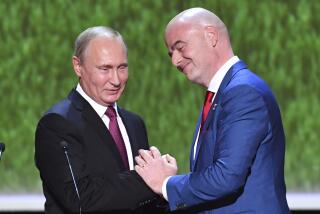Italy to take steps to curb violence
- Share via
ROME — After nine cacophonous months with a sprawling soccer match-fixing scandal, World Cup celebrations in streets and piazzas, punishments and appeals from the match-fixing scandal, and a tragic soccer riot in Sicily, Italy will harbor a surreal sound come Sunday afternoon.
Silence.
Barring last-minute changes, five of the 10 matches in Italy’s top soccer league, Serie A, will transpire in empty stadiums, a government stopgap in a national crisis after the death of a Sicilian police officer last Friday night in the post-match riot in Catania.
In some quarters, the many citizens quibbling with the decision might make the only noise.
When the Interior Ministry decreed that only six of 20 Serie A stadiums met adequate safety standards, it flung even superstar Ronaldo into prospective quiet. The celebrated 30-year-old Brazilian and three-time FIFA player of the year, just moved from Real Madrid to AC Milan in January.
Because the hallowed San Siro stadium that AC Milan shares with Inter Milan did not make the cut, AC Milan’s home match with Livorno will be silence-bound in a stadium that can seat 82,995.
In this spectatorless category, it joined Inter Milan’s visit to Chievo Verona (capacity: 42,160), Lazio’s visit to Atalanta (24,642), Udinese’s visit to Fiorentina in Florence (47,282) and Catania Calcio’s intra-Sicily visit to Messina (40,200).
Controversially, crowds for the other five matches in the 20-team league will file in as usual, albeit with added security. Their sites, including the Olympic stadium in Rome, ranked among the six stadiums that met the safety criteria.
“We footballers say there shouldn’t be discrimination because some stadiums are open and others closed,” Livorno striker Cristiano Lucarelli told Ansa, the Italian news agency. “Either we open the grounds to season-ticket holders or everyone should play behind closed doors.”
In various media outlets, several players hinted at a potential one-game strike because of the imbalance.
In Thursday’s editions of Corriere Della Sera, the national newspaper printed in Milan, Atalanta President Ivan Ruggeri said, “To play with closed doors means falsifying a championship.”
Aurelio De Laurentiis, club president of Napoli, accused the government of a “fascist climate.” Others are saying the government is failing to listen to the clubs.
Aldo Spinelli, the president of the Livorno club, told Corriere Della Serra, “There are only three possibilities: to all play with closed doors, to play all with open doors, or we stop.”
Italy did stop, but for only last weekend, after the death of policeman Filippo Raciti, 38, whose funeral Monday drew two hours of live national TV. Serie A always figures in debates involving fans over what is the world’s best league, and the league’s revenues are estimated to rank behind only England’s on the global stage.
In the consulting firm Deloitte’s rankings of the world’s 20 most valuable soccer clubs, released Thursday, four from Italy appeared in the top 20.
Carlo Brienza, the host of an Italian soccer TV program, said in an interview that barring some spectators “was a painful decision, difficult to take, but it had to be taken. It was useful because it allows the clubs and the local authorities to bring the stadiums back into line with the safety standards.”
Those standards include electric turnstiles, video surveillance cameras inside and outside stadiums, sufficient external stadium lighting, a section for police coordination of security, and barriers and gates at appropriate intervals for security checks.
TV footage this week showed electric turnstiles being delivered to San Siro.
The idea of playing matches behind closed doors has ample precedent in Italy -- and in San Siro -- because of concerns over violence and because of penalty measures in the match-fixing scandal. At least one match this year at Catania, site of the riot that triggered the decision, occurred in quiet out of security fears of the fringe elements of the oft-powerful “ultras,” or fan groups.
The soccer violence some observers long have lamented, but authorities seldom have tackled, crested famously at San Siro in spring 2005 during the European Champions League. In the second half of an AC Milan-Inter Milan quarterfinal match, Inter Milan fans became enraged with a referee’s ruling and pelted the field with bottles and debris.
As Dida, the AC Milan goalkeeper, attempted to clear an area to the right of the goal, a flare thrown from the upper deck smacked him in the right shoulder blade, causing bruising and first-degree burns. As punishment, Inter Milan paid a fine and played four home 2006-07 Champions League matches behind closed doors.
“Sure, from the point of view of the show, something is lost, that is without doubt,” said Brienza, the TV host. “But the question should be turned around. What, at the moment, is the priority on our scale of values? Is it to put on a second-rate show, or safety?”
Times staff writer De Cristofaro reported from Rome; freelance writer Culpepper from London.
More to Read
Sign up for Essential California
The most important California stories and recommendations in your inbox every morning.
You may occasionally receive promotional content from the Los Angeles Times.













